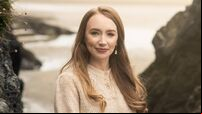‘There is no shame in wanting to heal from pain, anxiety and depression’

It's OK to Not be OK Podcast by Good Day Cork is hosted by Deborah Oniah who is based in Cork (Blue dress) with guests Sukhi Byrne, Danielle McLaughin and Sibusisiwe Mhlope. Picture: Clare Keogh
CORK-based Deborah Oniah and Joanna Dukkipati are the proud creators of Good Day Cork’s Podcast ‘It’s Ok To Not Be Ok’, a 30-minute audio documentary created by migrant women for migrant women.








 App?
App?


